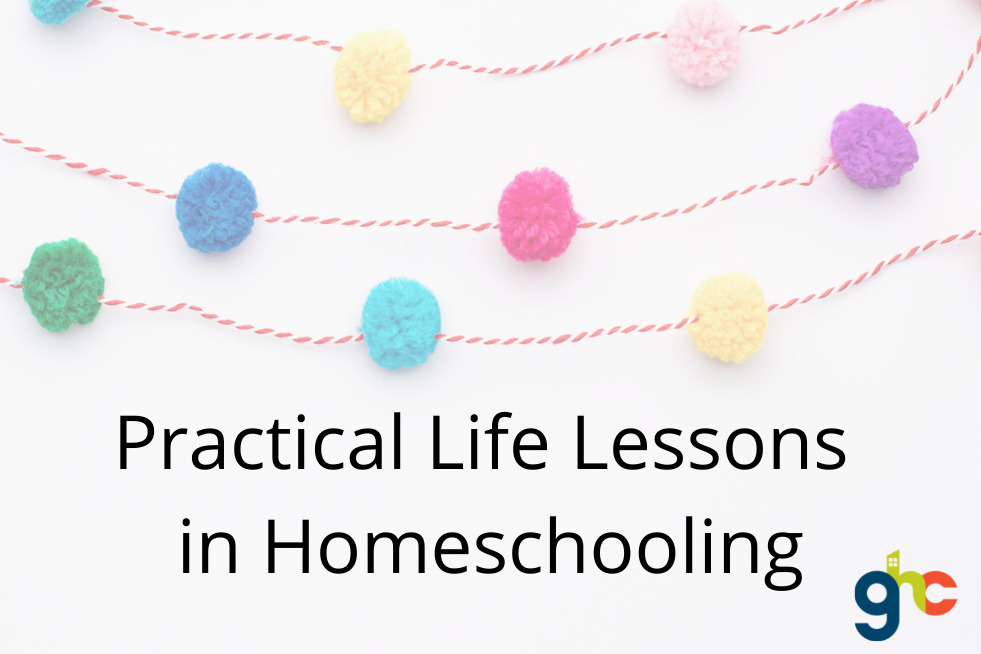Some of the best things that we can offer our children through homeschooling are practical life lessons they can carry with them for the rest of their lives. These are predominant in the Montessori teaching method and often start in PreK, with great value placed on them. On the other hand, there are many other life lessons that come through the very act of a home education itself. It isn’t always about math and science and geography as they’re written in the textbooks.
One day, our children will grow up and will need to function properly in society. What we give, through our homeschool journey, is a whole approach to life in general, and not simply the academics that can only take homeschoolers so far. Beyond that are character traits that will serve them through the good and the bad, so be sure, as an educator and a homeschooling parent, to keep your eyes open for any opportunity to foster this kind of personal growth.

Homeschooling While Rooted and Grounded in Faith
Surely, the most important thing we can teach our children, above all, through all, and in all, is that a relationship with Jesus Christ is crucial. Matthew 16:26 says, “For what has a man profited if he shall gain the whole world, and lose his own soul? Or what shall a man give in exchange for his soul?” God blesses us with our children, and we are then required to teach them about Him. Not doing so is a great injustice to our children.
There are many curriculum choices that we can use to teach this important truth. But I submit to you that the very best way we can teach our children about faith and God is by modeling a life that reflects our own faith. More often than not, they will pick up on this, even if we don’t make a concentrated effort to teach it in any other way. The old saying, actions speak louder than words, certainly comes into play for your homeschooled children!
Communication is Crucial in Homeschooling
Communication, according to curriculum and college prep tests, is often focused on reading, writing, understanding context, and being able to write in various ways to deliver a point or points. However, true communication extends far beyond that and can be a part of everyday learning in the home education environment, one that you won't find in public school systems or in most charter schools, or even private schools.
Speaking respectfully, for instance, is a great place to start. Whether your children are speaking to you, an elder, or a sibling, this is an important part of communication learning. Manners and truthfulness fall under this category, as well as learning discretion in speaking, posting to social media outlets, and being able to ask questions when necessary. These kinds of skills will begin in PreK and continue into elementary school, middle school, and high school. This is one area that will not know an age limit.
It’s important to remember, communication won’t look the same for every child. One major factor that comes into play is whether your child is an introvert or an extrovert. Being severely on one side or the other can often make proper communication harder than for the average child. On one hand, the child will not want to speak or participate in anything, and on the other hand, they will want to be in the middle of everything. I have one of each, and it truly takes some creative “ironing” to keep the wrinkles smoothed out.
Money Matters in Homeschooling
Your child is certainly going to have to know about finances as they get older, especially during their high school years and moving towards college. Allowing them to pass through this time without the proper knowledge of these things can cause many problems later on, many of which can haunt them for years to come.
Of course, they’ll learn to count money during the earlier years, and in my opinion, the sooner the better. But more importantly, they should also be taught the value of currency. For instance, they should know, right away, that if someone tells them a candy bar costs $10.00, that is far too much (at least as of this 2020 writing). Armed with this knowledge, homeschooling parents will have made it much harder for someone to take advantage of them financially.
Other financial concepts which should be taught include learning how to budget, investment opportunities, interest, credit, credit scores, and how to make money stretch if necessary. You might have other ideas that fall under this category, and that only lends to the uniqueness of your child’s education. The bottom line is, that you do not let them graduate without a firm grasp on the most important things, and many of these concepts can be taught without a homeschool curriculum, rather taught simply throughout day-to-day living.
Homeschooling Through Life Skills and More Life Skills
When we think of “life skills” these days, we often think in terms of learning how to run a washer and dryer, cook, do dishes, and clean. And it’s true that these are certainly of the utmost importance, especially in large homeschool families. But life skills go much further than simple home economics. For instance, in the technological age in which we now live, knowing a good deal about computers, smartphones, tablets, and other electronic devices can be very important. Not only do we use them in communication, banking, and enrollment in an online school, but they can help in many other specialized areas as well through programs and apps.
One very important topic of conversation among those not in the homeschooling category is socialization. Simply teaching your children how to deal with naysayers when the subject arises is an important life skill to teach.
It is my personal conviction that all children should learn how to swim. And the earlier the better. This could not only save their own life one day, but they could be instrumental in saving someone else’s life. Field trips, vacations, or simply traveling to an area near water for any reason can all bring them into an environment where swimming could be very important.
Other life skills you might consider including, even in hobby form, are sewing, making things from scratch, how to work on cars or small machinery, and public speaking. If there are life skills that you aren't skilled at teaching, consider finding a homeschool co-op or homeschool program to help. It's even possible that you could trade teaching time with other homeschooling families. Homeschool support groups may also have resources available to you that will give you ideas on how to teach this valuable skill.
You might find that life skills become even more important for your homeschooled kids, and might look much different if you have a child with special needs. This can cause a new, full-time level of teaching life skills as a part of your daily routine. You and your children will value going at your own pace in this area, which is one asset of homeschooling.
Life skills are the reason that many homeschoolers decide to become an unschooling family. Teaching life skills in day-to-day life is important, but often can be taught in tandem with learning subject topics, especially when unschooling. Because homeschooling can look very different from traditional school, many outside the homeschool community will question whether you are finding success as a homeschool family.

In Closing
When you homeschool your child, there are many practical life lessons to learn and teach during your homeschooling journey, and many more to learn as well. In fact, it might be in some of what you consider to be your biggest failures, that the greatest life lessons are learned. It’s not always going to be smooth sailing but knowing that there is some good to come of even the bad days can really help adjust your expectations.
Remember to focus on what you know will be most important to your child. Life lessons cross all barriers and are not limited to specific professions. The child who enters the field of medicine or law may or may not need to know how to work on a lawnmower or build a house. He/she will, however, be faced with ethical decisions; moral principles that will govern his/her conduct.
